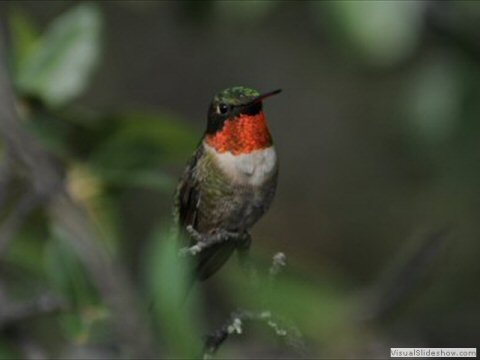

Ruby-throated BandingBreeding Birds and Migrants | |
|
In addition to the Winter Hummingbird research project, Nancy has also maintained for the last fifteen years a banding site focused on breeding population and migratory Ruby-throated Hummingbirds. The site, located near Covington, Louisiana, also hosts wintering hummingbirds and is one of her winter banding sites. One interesting result from the project is learning that despite the widespread abundance of Ruby-throated Hummingbirds in Louisiana in September and early October, none of those birds are likely local breeders, which have by that point left the state. By color-marking birds throughout the breeding season, the researcher can tell (when there are no more birds with that color-marking scheme) when the last of the breeding-population birds has left, and that point appears to be mid-August. Another interesting result is that despite having banded many wintering Ruby-throats in the state, none have ever been recaptured in Louisiana during the breeding season, and only one has been recovered elsewhere. This suggests that they are not local birds which failed to migrate, but migrants from elsewhere. In fact, none of the hundreds of Ruby-throated Hummingbirds banded in the United States in the winter season has ever been recaptured during the breeding season, anywhere. The one recovery was of a bird banded by project bander Linda Beall in Covington, Louisiana, and found dead the next summer in Manitoba, Canada. This supports our hypothesis that our wintering population comes to us from some distance, perhaps wintering here because those birds are late hatchlings (and hence, late departures) whose migratory instincts caused them to stop short of the full trip to Mexico or Central America. Despite our best efforts, returns from banding migrant Ruby-throated Hummingbirds are scarce. We do have a record of a Ruby-throated banded in September that was recaptured a week later in Rockport, Texas - showing that there is some circum-Gulf migration in the fall, as we suspected. |
 |